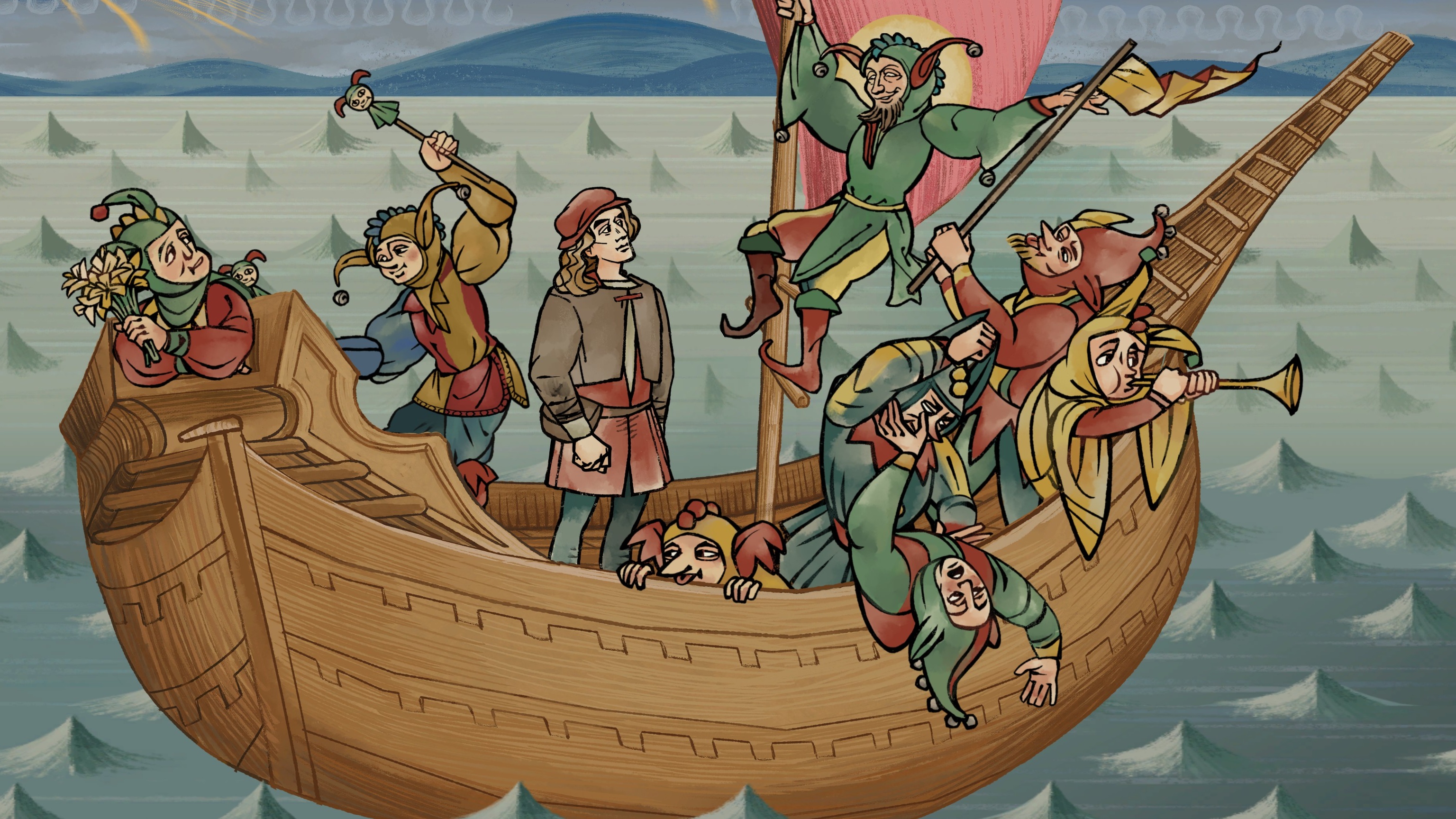Our Verdict
A beautiful and beautifully-written narrative game that makes masterful use of its early modern setting. One of Obsidian's finest.
PC Gamer's got your back
What is it? A narrative-driven mystery set in a 16th-century Bavarian village.
Expect to pay $19.99/£14.99
Developer Obsidian
Publisher Xbox Game Studios
Reviewed on Ryzen 7 3700X, GTX 1080 Ti, 16GB RAM
Multiplayer? No
Link Official site
There’s blood on the walls of Kiersau Abbey. Beneath a long mural of the Danse Macabre lies a jewel-festooned corpse: A visiting nobleman has been murdered behind the monastery’s doors, shattering years of monastic peace and jeopardising the surrounding village of Tassing, Bavaria.
It’s 1518 and Europe is teetering over an ocean of blood: Martin Luther is threatening a thousand years of papal dominance of western Christianity, Tassing’s peasants chafe loudly under onerous taxes, and the rich and powerful are—as ever—guarding their riches and power with rough men ready to do violence on their behalf. If there’s ever a good time to find a dead aristocrat splayed across the floor of your monastery, this isn’t it. To make matters worse, the most convenient culprit for the powers-that-be to pin the whole mess on is the person that found the body: Your friend and mentor.
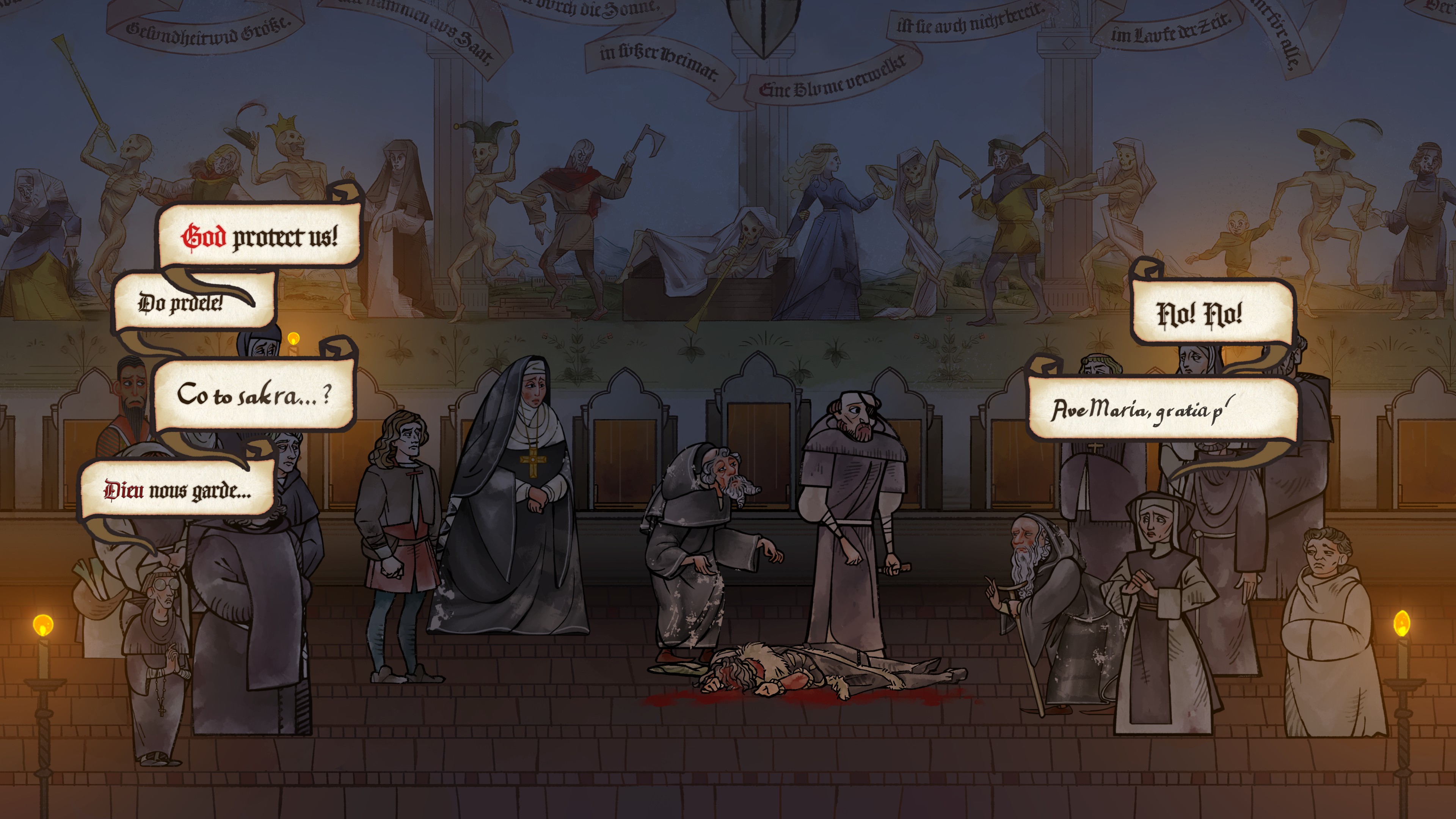
"You" in this instance is Andreas Maler, a journeyman artist who has taken up temporary residence in Tassing to work in the abbey’s scriptorium—a room for the writing and illustration of manuscripts and a relic of a bygone age, long since surpassed by innovations like the printing press. Andreas, as a relatively well-to-do outsider with little motive to bludgeon a blue-blood to death but ample reason to save his friend, takes it upon himself to find the true killer. You have too many suspects and not enough time to gather the evidence you need to convince the adjudicator—and yourself—that one of them is guilty. However you choose to spend your time, there are going to be stones left unturned and questions unanswered.
Better choose wisely then, eh? That’s the heart of Pentiment, at least on a mechanical level: Making your choices and watching the ripples spread out over the course of the game’s 25-year timespan. Yes, you have to solve the noble’s murder, but that’s only the first of a few scandals that unfold over the course of the game. This is still Obsidian, after all, even if the game was developed by a skunkworks division of the studio made up of 13 people and headed by Josh Sawyer, director of Fallout: New Vegas and Pillars of Eternity.
It’s not an RPG: You won’t pour points into character stats at any point. But don’t worry, if anything that just leaves more room for narrative choices to agonise over and regret over the game’s 20-hour runtime.
The Art of Murder
The bulk of those choices revolve around how you’ll spend your time. The people demand justice and lack patience. You’ll have to serve up a suspect in a matter of days, which means every hour counts.
That’s not as painful as it might sound. There’s no ticking clock. Exploring the town—which is rendered in an evocative style reminiscent of the era’s illuminated manuscripts and woodcuts—and most conversations don’t take time at all. Instead, each part of the day (divided into the major and minor hours of prayer, naturally) concludes when you make a significant decision. That could be exploring the old Roman salt mine on the edge of town, it could be sitting down to dinner with a suspect, but the game almost always makes it clear when you’re about to push time forward and, possibly, sacrifice an opportunity to pursue one of the other big leads you’ve uncovered.
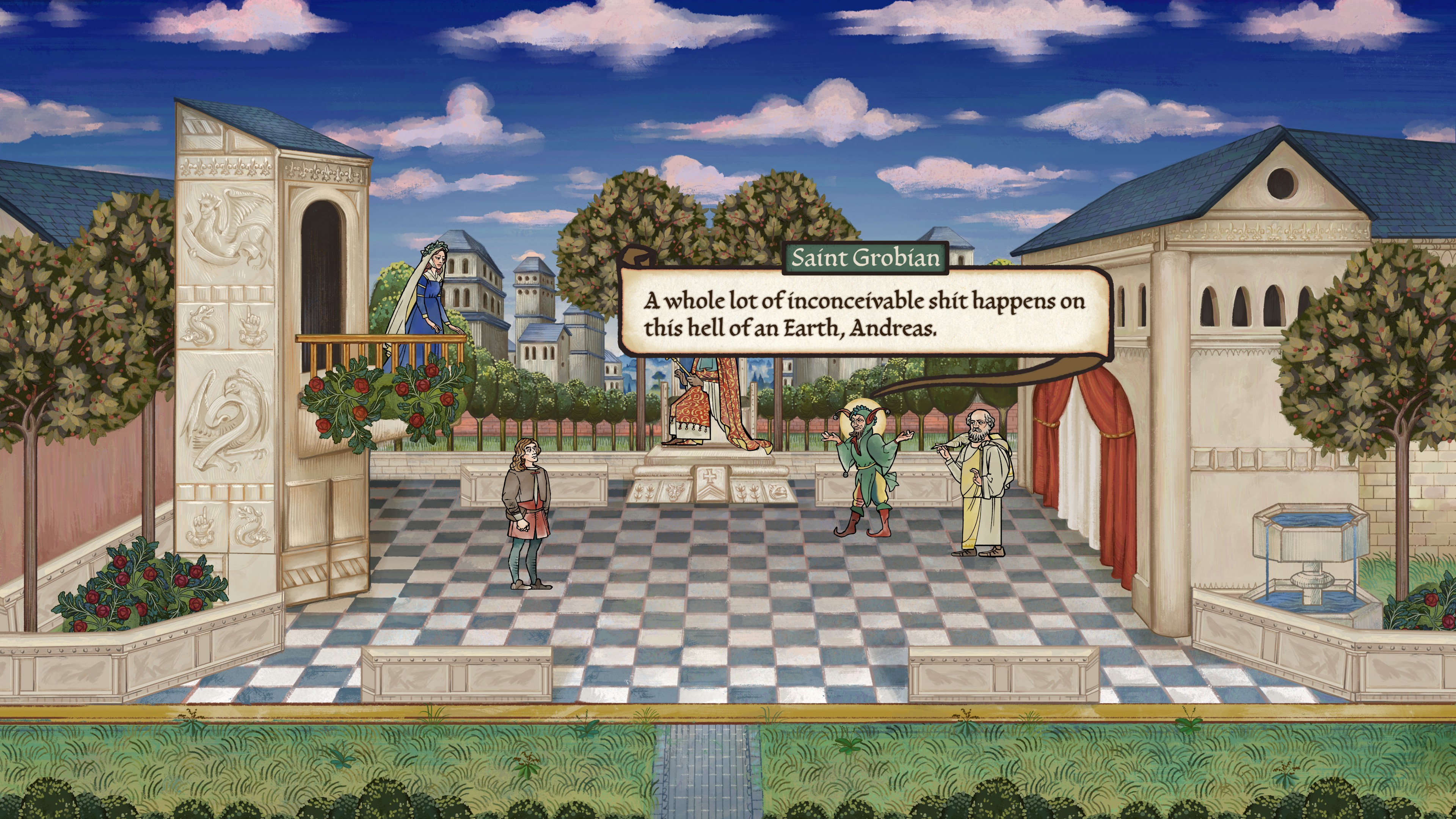
It works well. You’ll always be left wondering what you might have uncovered if you’d picked option B instead of A, and the game is never so kind as to tell you if you got the right culprit. I remain convinced that the person I eventually served up to the headsman’s axe was just unlucky. I happened to focus on them instead of one of my other suspects and collected more evidence that pointed to them as a result. It’ll take multiple playthroughs and a lot of different choices to paint a full picture of how all of Tassing’s possible suspects really relate to the nobleman’s murder. Cold comfort to the poor guy I sent to lose his head before a baying mob.
The people demand justice and lack patience. You’ll have to serve up a suspect in a matter of days, which means every hour counts.
One qualm, though: While the game almost always gives you fair warning when you’re about to sacrifice a chunk of time or a potential line of inquiry, I did run into a couple of occasions where I only realised I’d made a choice after I’d made it. Not often, and not major, but frustrating in a game that revolves around your choices and their consequences.
There’s the odd minigame—including a variation of the card game Lansquenet that I liked so much I lost all of Andreas’ money on it—but don’t be fooled, they’re more about taking a break from interrogations than posing a real mechanical challenge. For the most part you’re going to be exploring, chatting, and experiencing the game’s rich and textured collection of fonts.
My god, the fonts. Never before has a game made such conscious and incredible use of fonts. With no voice acting (beyond a few achingly authentic bits of hymnal music), everything in Pentiment comes down to the stroke of a pen. How Andreas perceives someone’s status, social position, level of education, it’s all encapsulated by the font the game uses to represent their dialogue. Priests speak in an intimidating and laborious gothic script, peasants in a variable scratch, the highfalutin petit-bourgeoisie in a mess of serifs and curlicues, and people like Andreas in a sober and readable humanist style. Unpretentious, maybe even progressive, but distinctly an outsider.
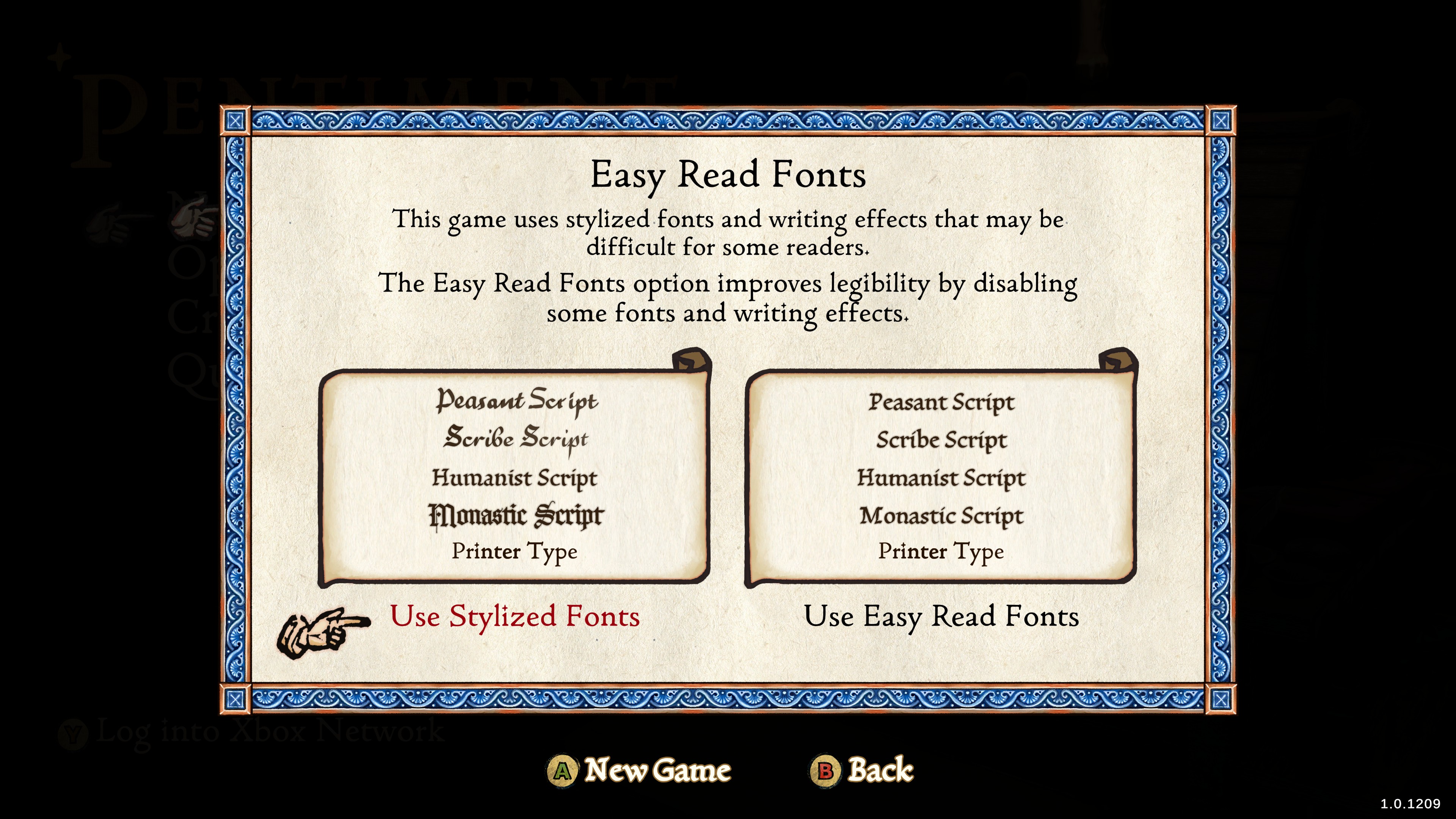
About the Artist
But when you’re solving a murder, an outsider’s precisely what you need. Not long after the game starts, you’ll get to make decisions about Andreas’ past before he came to the village. Where did he spend his gap year? What are his hobbies? What did he study at university?
In an effort to reflect myself in Andreas’ character, I made him an insufferable dweeb: a logic-minded bookworm who studied imperial law and oratory, and who spent his gap year flouncing about in Italy, meaning he could speak Italian. I could just as easily have made him a hedonistic occultist who spent a year in Belgium, or a petty criminal with a mind for Roman history.
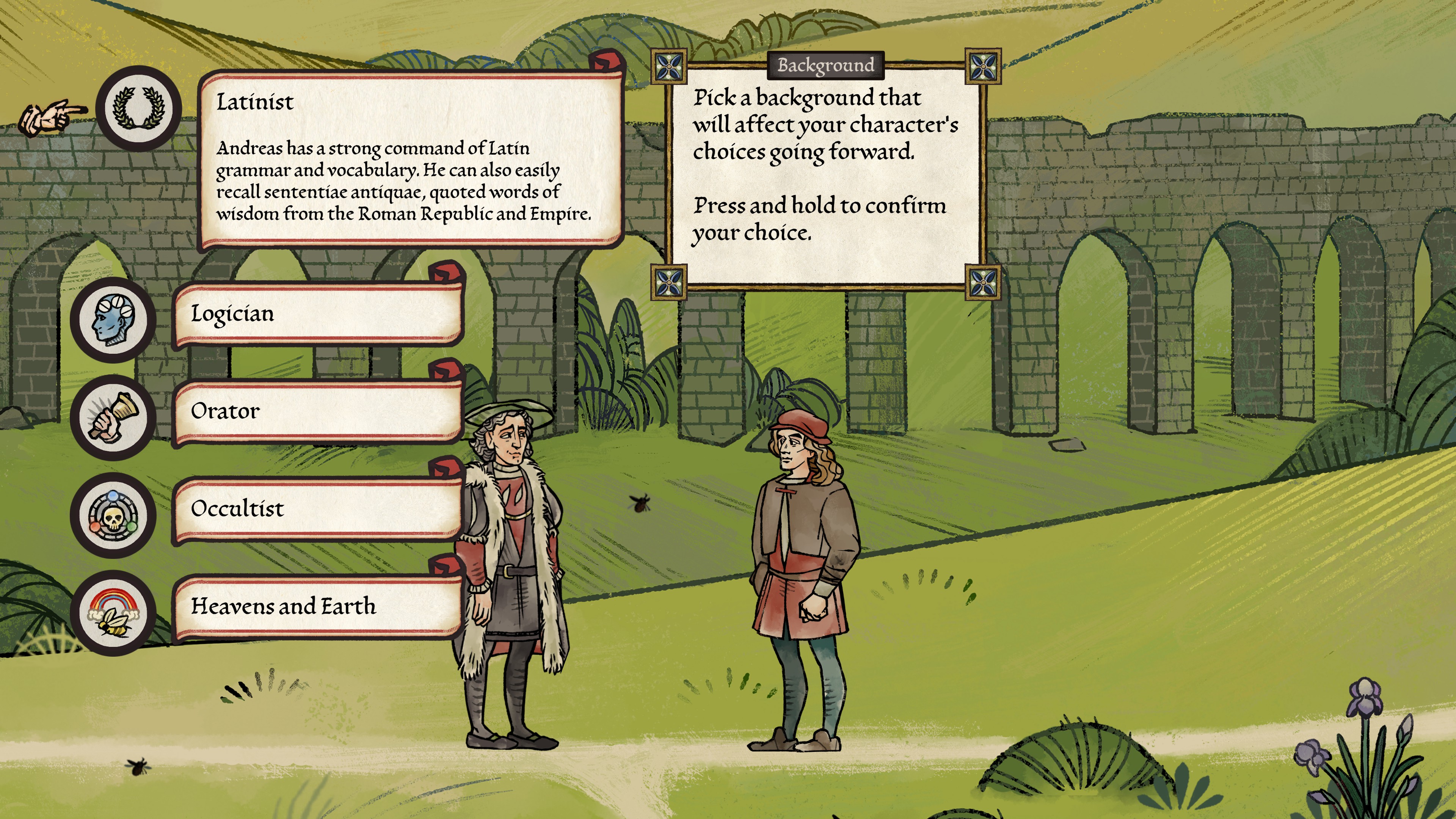
The choices you make about Andreas’ background add new options in conversations and decisions later in the game. My skill in oratory let me make impassioned, flowery pleas instead of straightforward requests, my bibliophilia gave me multiple chances to make borderline-worrying declarations about the sanctity and beauty of books, speaking Italian let me, well, speak to Italians, and so on. Those choices can cascade and give rise to new traits, too. My bookworm Andreas agitated so hard against the destruction of a heretical text that the authorities eventually let him keep it to shut him up. A few years later, he was wandering around with a new trait and some dangerously mystical ideas in his head.
There aren’t RPG-style speech checks, though, and it’s not always the right choice to default to clicking the dialogue option you unlocked through a character trait. By choosing imperial law as my main area of study at university, I may as well have ticked a box marked 'Pretentious blowhard'. Every single time I showed off my legal knowledge, I annoyed the person I was talking to so much that I incurred penalties on subsequent persuasion checks, which work by totting up your positive and negative interactions and seeing if you cross a certain persuasion threshold, rather than by rolling dice or checking a character stat.
If you want to convince someone of something, you have to take into account their character and the context of your conversation. Sometimes the trick to persuading someone to help you out isn’t the super-special unique dialogue choice you got from your background, it’s one of the plain-Jane options that everyone gets, but sometimes the reverse is true, too. It’s a much more nuanced and rewarding system than dumping points into a speech stat, even if I was unjustly punished for my love of the law.
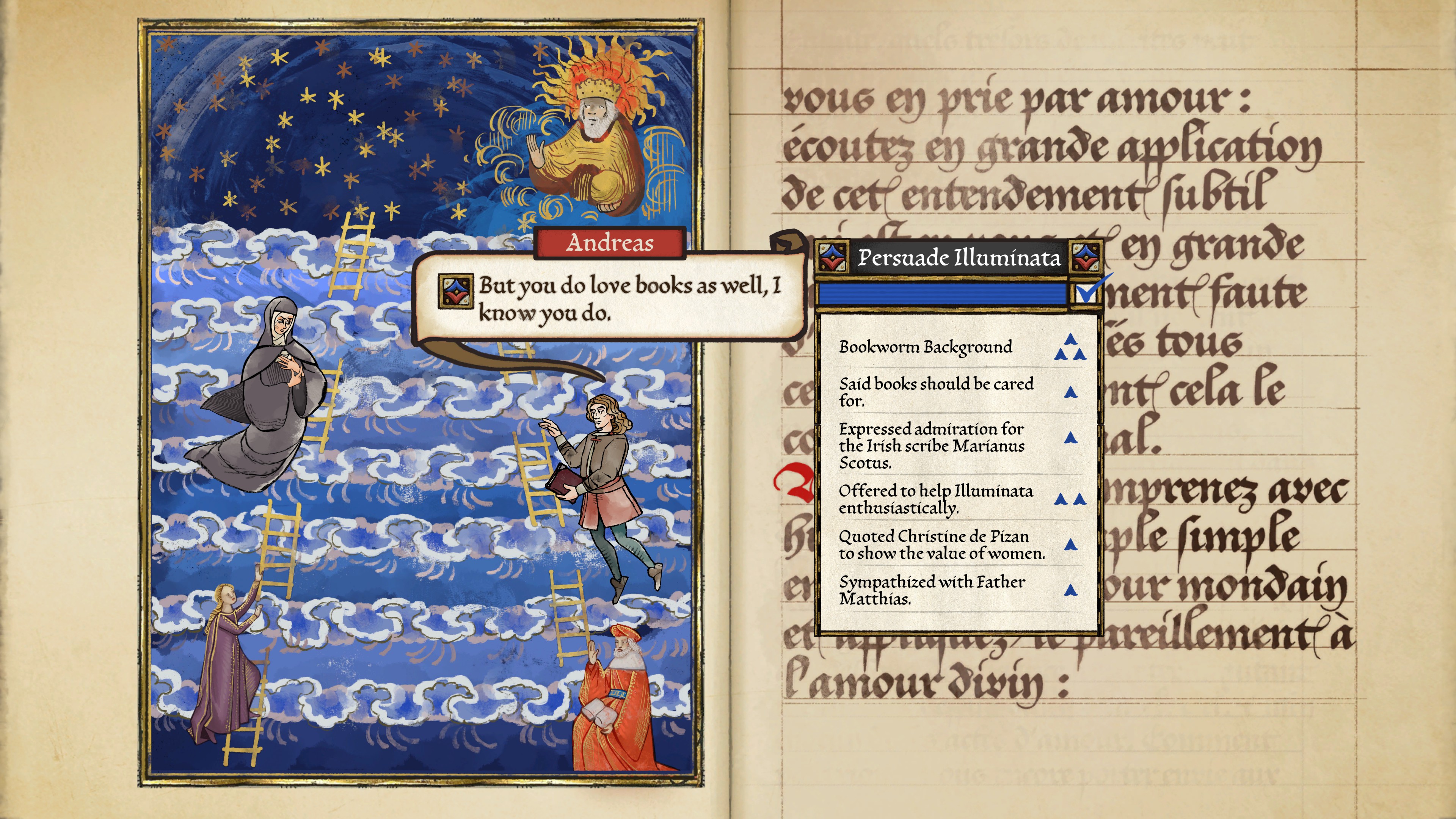
So many faces
But Pentiment’s real triumph is Tassing itself. As you traipse around town and butt into the lives of the village’s families, you’ll end up forming relationships with all of them. Over 25 years of chats, shared meals, and evening masses, you’ll watch children turn into adults, adults enter their dotage, and the elderly fade away (or stubbornly hold on, in defiance of natural law and common sense). That makes it all the harder when you want to condemn a family man for a crime he might not actually have committed.
The villagers too are shaped by your choices. Buy an encyclopaedia as a present for a precocious youngster and they could grow up to be an incorrigible nerd. Just don’t get them into imperial law if you want them to have any friends, I suppose.
It’s great, but it’s also related to my biggest issue with the game. While Pentiment is very good at defining all its weird, early modern terminology—you can hit the back button when pretty much any unfamiliar term pops up to get a quick definition—I found myself regularly losing track of Tassing’s myriad characters, especially because they kept inconsiderately getting older and changing appearance. You can hit the back button when a person’s name is mentioned, but all that shows you is their picture (which is extra unhelpful if it’s an adult picture of a character you’ve only known as a child). For some people, maybe that’s enough, but I certainly couldn’t keep track of the whole village based on their appearance alone, so I spent a lot of time rifling through the game’s character index to figure out just who the hell "Martha" was.
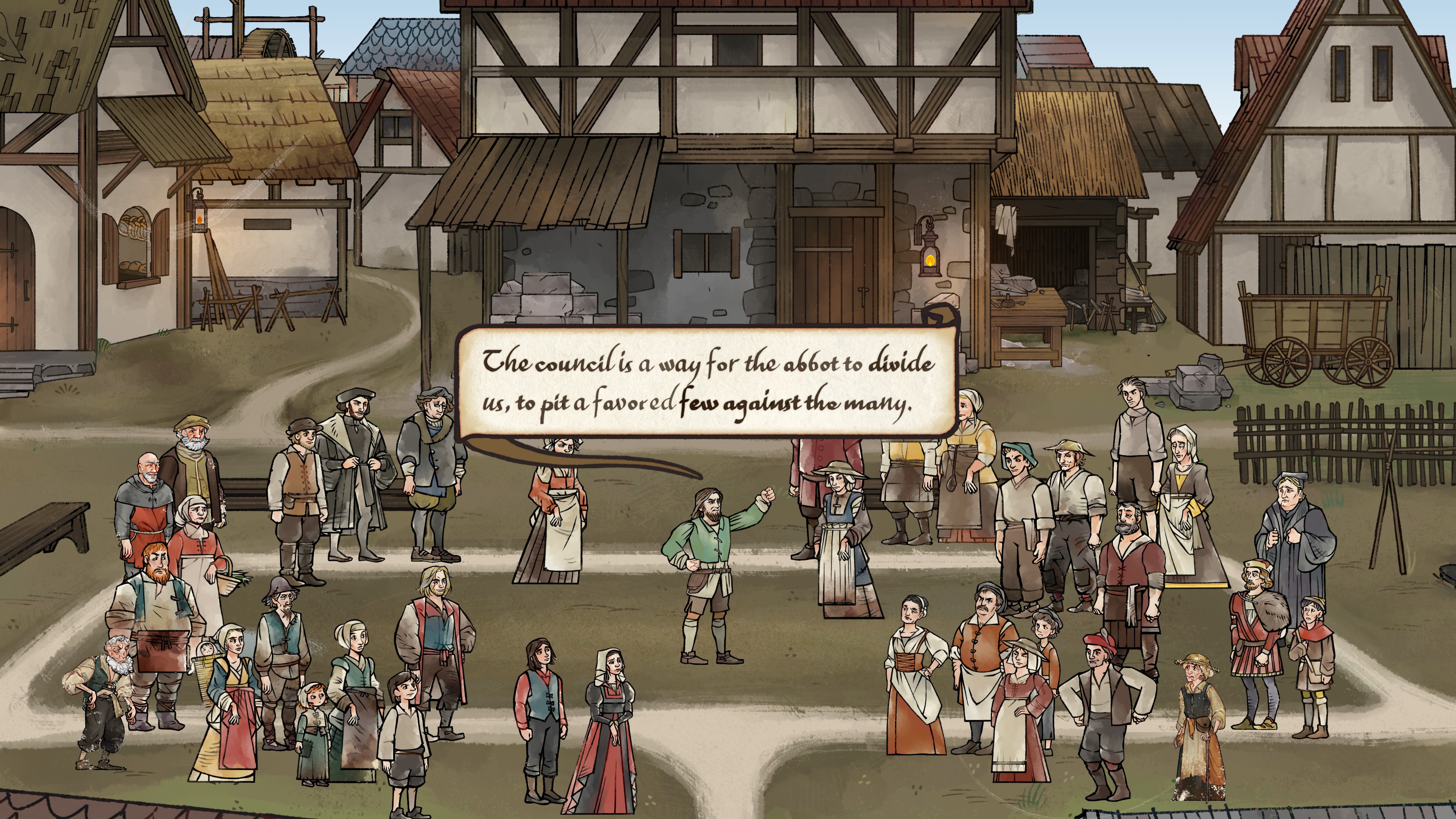
The game’s era and setting aren’t set dressing, an early modern aesthetic to drape over a murder mystery that could have been set wherever, whenever. Tassing is a town riven with the contradictions of the 16th century. The peasants resent the priests, the priests are suspicious of the peasants, the town’s tradespeople vacillate between the two and absolutely everyone hates the stuck-up miller on the edge of town, who represents the first green shoots of a capitalism that will, a few short centuries hence, come to obliterate this land and its way of life entirely.
It’s a historical materialist style of storytelling that completely justifies the game’s quarter-century timespan. The people of Tassing make their own history, but they don’t make it as they please. The engine of class struggle churns away beneath the surface, accelerated by events and choices like the murder in the abbey and slowed by others, but never stopping. Tassing is still very recognisably Tassing after 25 years, we’re not talking the Scouring of the Shire here, but it’s been marked indelibly by history just like it has been a thousand times before, just like it will be again. The future arrives inexorably, but it only paints over the past. A pentimento, in case you’re wondering, is when painted-over elements in a work of art reemerge later on down the line.
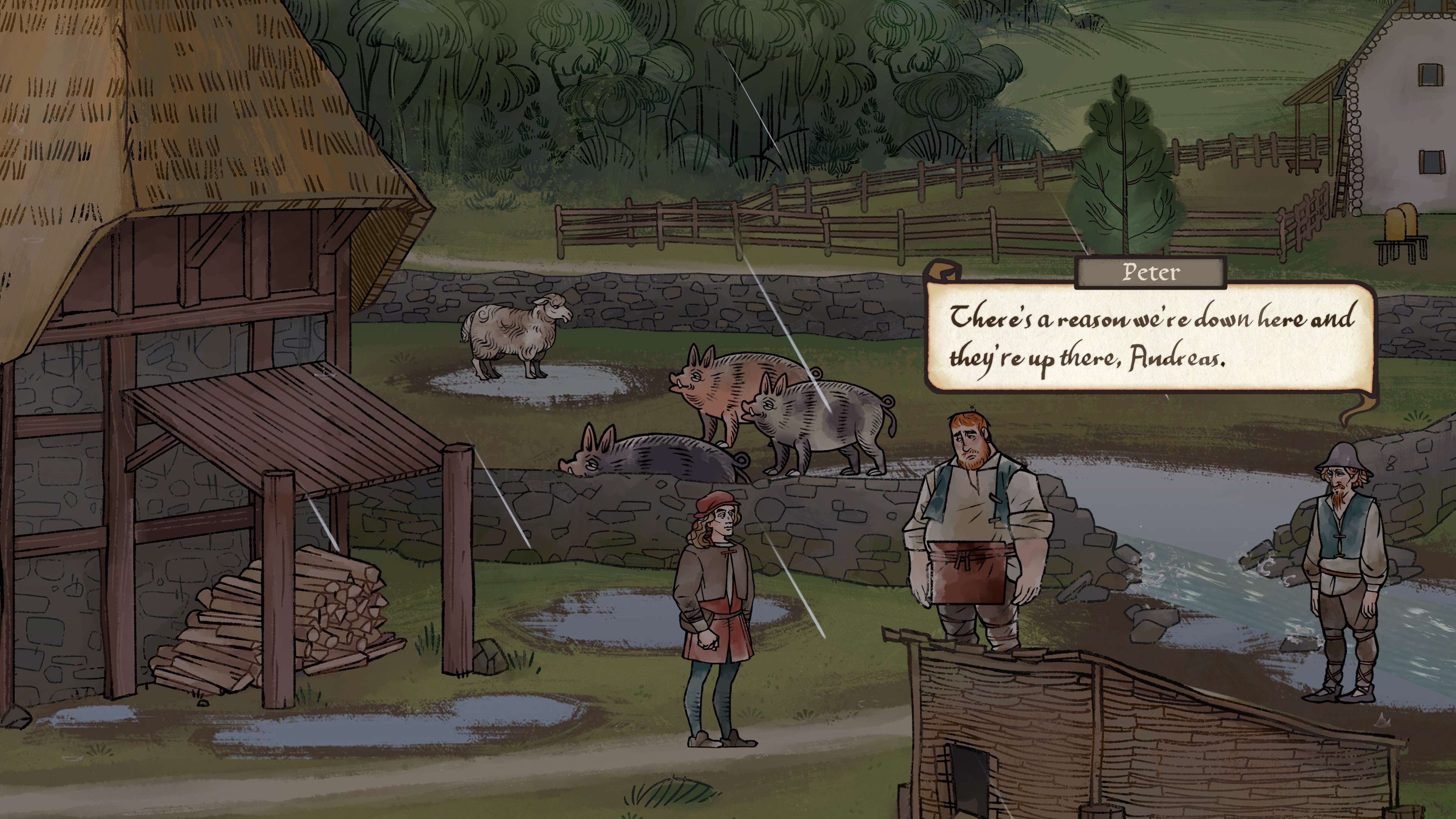
Layer upon layer
Pentiment is a rare beast: A relatively short, gameplay-light narrative adventure from a studio renowned for its lengthy, mechanics-heavy RPGs. Even stranger, the team pulled it off with aplomb. Yes, there are some mechanical quibbles, and it did take some coaxing to get me to accept the central mystery’s final resolution, but Obsidian’s tight grasp on its subject matter and thorough understanding of exactly what it wanted to do with Pentiment has produced a game that I wanted to launch again just as soon as I finished it. I want to see what happens when I pick a different constellation of background traits, pursue different leads, and pass the persuasion checks I failed (and fail the ones I passed).
At 20 hours, Pentiment is a short game compared to some of the hundred-hour titans we've seen this year, but it's a game I see myself replaying a lot in the years to come. I get the feeling that I'll need to spend a lot more time in Tassing before I even scratch the surface.
A beautiful and beautifully-written narrative game that makes masterful use of its early modern setting. One of Obsidian's finest.

One of Josh's first memories is of playing Quake 2 on the family computer when he was much too young to be doing that, and he's been irreparably game-brained ever since. His writing has been featured in Vice, Fanbyte, and the Financial Times. He'll play pretty much anything, and has written far too much on everything from visual novels to Assassin's Creed. His most profound loves are for CRPGs, immersive sims, and any game whose ambition outstrips its budget. He thinks you're all far too mean about Deus Ex: Invisible War.
